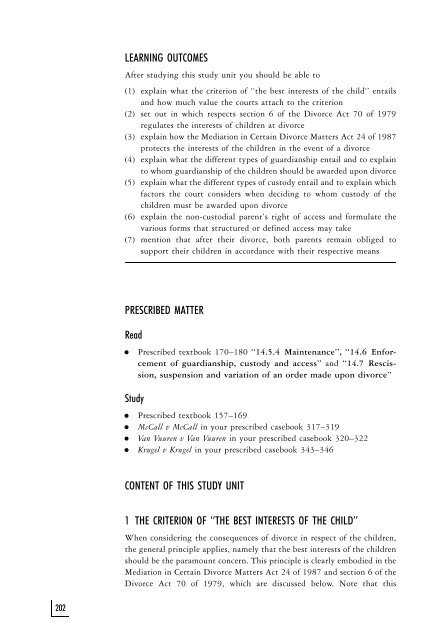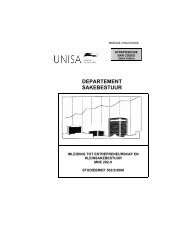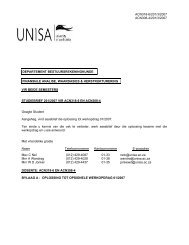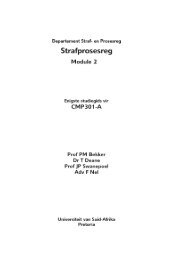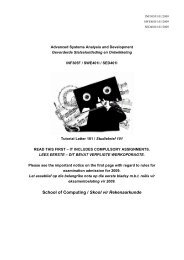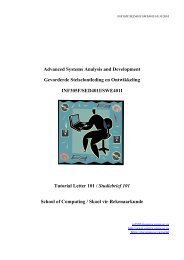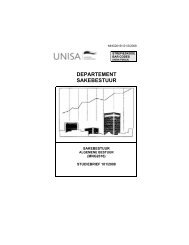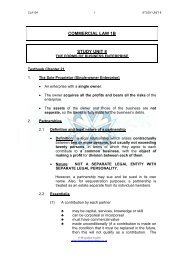- Page 2 and 3:
# 2000 University of South Africa R
- Page 4 and 5:
iv 17 Forfeiture of patrimonial ben
- Page 6 and 7:
vi Ð analyse and critically evalua
- Page 8 and 9:
The content of this module can be g
- Page 10 and 11:
x Bibliography Cronje DSP & Heato
- Page 12 and 13:
xii guide you are told what to read
- Page 15 and 16:
Glossary
- Page 17 and 18:
ad litem for the case or suit affid
- Page 19 and 20:
descendants your descendants are th
- Page 21 and 22:
legislation things like Acts, procl
- Page 23 and 24:
e in connection with or in the case
- Page 25:
void marriage a marriage which has
- Page 28 and 29:
2 SECTION I Introduction to family
- Page 30 and 31:
4 STUDY UNIT 1 In preparation MODUL
- Page 32 and 33:
Order in which authoritative source
- Page 34 and 35:
8 South Eastern Cape local division
- Page 36 and 37:
10 without qualification. Where a p
- Page 38 and 39:
12 2.4 The magistrates' courts and
- Page 40 and 41:
14 STUDY UNIT 2 Content of family l
- Page 42 and 43:
Wide and narrow meaning 16 branches
- Page 44 and 45:
18 STUDY UNIT 3 Historical overview
- Page 46 and 47:
20 HAVE YOU READ THE ``KEY TO THE S
- Page 48 and 49:
22 Engagement SECTION II Marriage l
- Page 50 and 51:
24 Engagement STUDY UNIT 4 The enga
- Page 52 and 53:
Distinction between engagement and
- Page 54 and 55:
28 in the missing words. The words
- Page 56 and 57:
ACTIVITY This activity tests your u
- Page 58 and 59:
Lawfulness and possibility Finalisa
- Page 60 and 61:
ACTIVITY On page 12 of your prescri
- Page 62 and 63:
36 engagement, the courts calculate
- Page 64 and 65:
Action on ground of seduction 38 FE
- Page 66 and 67:
40 fallen in love with another woma
- Page 68 and 69:
42 marriage itself. First of all yo
- Page 70 and 71:
Prodigal Insane person Person place
- Page 72 and 73:
had been so threatened and assaulte
- Page 74 and 75:
Adoptive parent and adopted child P
- Page 76 and 77:
Common ancestor prospective spouses
- Page 78 and 79:
Blood relatives in direct line Bloo
- Page 80 and 81:
54 (2) (a) T is related to Mr A wit
- Page 82 and 83:
56 QUESTIONS NB: Make sure that you
- Page 84 and 85:
Engagement STUDY UNIT 6 The civil m
- Page 86 and 87:
60 INSTANCES PERSON/PERSONS/AUTHORI
- Page 88 and 89:
62 antenuptial contract, the questi
- Page 90 and 91:
64 (2) Whose consent is needed if a
- Page 92 and 93:
66 LEARNING OUTCOMES The purpose of
- Page 94 and 95:
(3) When only can a man apply for t
- Page 96 and 97:
70 ACTIVITY Place each of the follo
- Page 98 and 99:
Legitimacy of a child born of a put
- Page 100 and 101:
74 Engagement STUDY UNIT 8 The inva
- Page 102 and 103:
Variable versus invariableconsequen
- Page 104 and 105:
Maintenance = support Meaning of ``
- Page 106 and 107:
Requirements for capacity Terminati
- Page 108 and 109:
Revocation or limitation of the cap
- Page 110 and 111:
84 FEEDBACK This statement is false
- Page 112 and 113:
86 (16) Discuss the concept ``house
- Page 115 and 116:
Matrimonial property law Section II
- Page 117 and 118:
OVERVIEW In section III we look at
- Page 119 and 120:
Primary matrimonial property system
- Page 121 and 122:
3.1 Assets Joint assets In your pre
- Page 123 and 124:
Jacob also exchanges the tractor wh
- Page 125 and 126:
Attachment of separate assets FEEDB
- Page 127 and 128:
Debts incurred during the subsisten
- Page 129 and 130:
QUESTIONS NB: Make sure that you ca
- Page 131 and 132:
Marriage in community of property N
- Page 133 and 134:
Equal concurrent management Section
- Page 135 and 136:
lawfully since Mr Khumalo's written
- Page 137 and 138:
FEEDBACK CIRCUMSTANCES CONSEQUENCES
- Page 139 and 140:
Requirements: (a) The court should
- Page 141 and 142:
study unit (study unit 9) where the
- Page 143 and 144:
PLEASE NOTE: YOU SHOULD ALSO BE ABL
- Page 145 and 146:
found in such a contract. The next
- Page 147 and 148:
FEEDBACK The Deeds Registries Act 4
- Page 149 and 150:
not, as many people wrongly think,
- Page 151 and 152:
Marriage in community of property N
- Page 153 and 154:
Aim of legislature in introducing a
- Page 155 and 156:
Accrual and accrual claim relate to
- Page 157 and 158:
ACTIVITY Provide a summary of the s
- Page 159 and 160:
The accrual in Mr X's estate is cal
- Page 161 and 162:
suffered and/or still suffers, and
- Page 163 and 164:
Marriage in community of property N
- Page 165 and 166:
Relaxation of principle of immutabi
- Page 167 and 168:
Requirements Procedural requirement
- Page 169 and 170:
concluded before the marriage. Subs
- Page 171:
not change their matrimonial proper
- Page 174 and 175:
148 SECTION IV Dissolution of marri
- Page 176 and 177:
150 IV DISSOLUTION OF MARRIAGE Deat
- Page 178 and 179: Extra-judicial separation Predeceas
- Page 180 and 181: 154 (3) the standard of living of t
- Page 182 and 183: 156 IV DISSOLUTION OF MARRIAGE Deat
- Page 184 and 185: . Prescribed textbook 124±126 ``11
- Page 186 and 187: 160 (2) Provide a short explanation
- Page 188 and 189: Criteria contained in subsections 5
- Page 190 and 191: Special rules You must also note th
- Page 192 and 193: 166 (15) How do the provisions of s
- Page 194 and 195: 168 Now that you know what the grou
- Page 196 and 197: Scope of provisions Lastly, you sho
- Page 198 and 199: 172 STUDY UNIT 17 Forfeiture of pat
- Page 200 and 201: Undue benefit Justness and fairness
- Page 202 and 203: 176 marriage out of community of pr
- Page 204 and 205: 178 IV DISSOLUTION OF MARRIAGE Deat
- Page 206 and 207: Prerequisites Prerequisite that spo
- Page 208 and 209: 4 OTHER CONSIDERATIONS THE COURT TA
- Page 210 and 211: Equal distribution between spouses
- Page 212 and 213: 186 (1) the order's source of law (
- Page 214 and 215: 188 . Form of a redistribution orde
- Page 216 and 217: 190 LEARNING OUTCOMES The purpose o
- Page 218 and 219: Factors Weight attached to factors
- Page 220 and 221: 194 FEEDBACK (1) Mrs Kahn will prob
- Page 222 and 223: Dum casta clause party in whose fav
- Page 224 and 225: 198 PRINCIPLE CASE NAME (4) The app
- Page 226 and 227: 200 . Waiver of the right to claim
- Page 230 and 231: Definition of guardianship Awarding
- Page 232 and 233: Mother as custodial parent Your tex
- Page 234 and 235: Custody to a third party In the sec
- Page 236 and 237: 210 made a restrictive order simila
- Page 238 and 239: 212 . Access (16) What does the con
- Page 240 and 241: 214 LEARNING OUTCOMES The purpose o
- Page 242 and 243: Limitation on publication Exception
- Page 244 and 245: 218 SUMMARY In this study unit you
- Page 246 and 247: Customary marriages concluded befor
- Page 248 and 249: Customary marriages concluded befor
- Page 250 and 251: Invalid ito common law Valid ito Ac
- Page 252 and 253: Position before commencement of the
- Page 254 and 255: Ground for divorce Patrimonial cons
- Page 256 and 257: Customary law part of culture Custo
- Page 258 and 259: 232 . Registration of the marriage
- Page 260 and 261: 234 . how a customary marriage can
- Page 262 and 263: 236 SECTION VI Muslim marriages MOD
- Page 264 and 265: 238 (2) set out the legislative rec
- Page 266 and 267: 240 surviving spouse in a monogamou
- Page 268 and 269: 242 and Muslim marriages constitute
- Page 271 and 272: Life partnerships Section VII
- Page 273 and 274: STUDY UNIT 24 Life partnerships MOD
- Page 275 and 276: 2 GENERAL The general rule of our l
- Page 277 and 278: espectively, certain job-related be
- Page 279:
. Definition (1) What is a life par
- Page 282 and 283:
256 SECTION VIII Domestic violence
- Page 284 and 285:
(3) indicate that in terms of the D
- Page 286 and 287:
260 In the next section we deal wit
- Page 288 and 289:
262 SECTION IX Children's rights an
- Page 290 and 291:
264 STUDY UNIT 26 Children's rights
- Page 292 and 293:
Ways to obtain authority 266 regula
- Page 294 and 295:
Wide and narrow meaning Guardianshi
- Page 296 and 297:
Meaning of judicial interference it
- Page 298 and 299:
272 (2) Which special rights are gi
- Page 300 and 301:
274 . what parental power is . how
- Page 302 and 303:
In this study unit we shall look at
- Page 304 and 305:
In Petersen v Maintenance Officer t
- Page 306 and 307:
280 (7) Does a stepparent have a du
- Page 308 and 309:
282 SECTION X Guardianship and cura
- Page 310 and 311:
284 You will further note in this s
- Page 312 and 313:
Definitions 286 1.2 The requirement
- Page 314 and 315:
288 QUESTIONS NB: Make sure that yo


